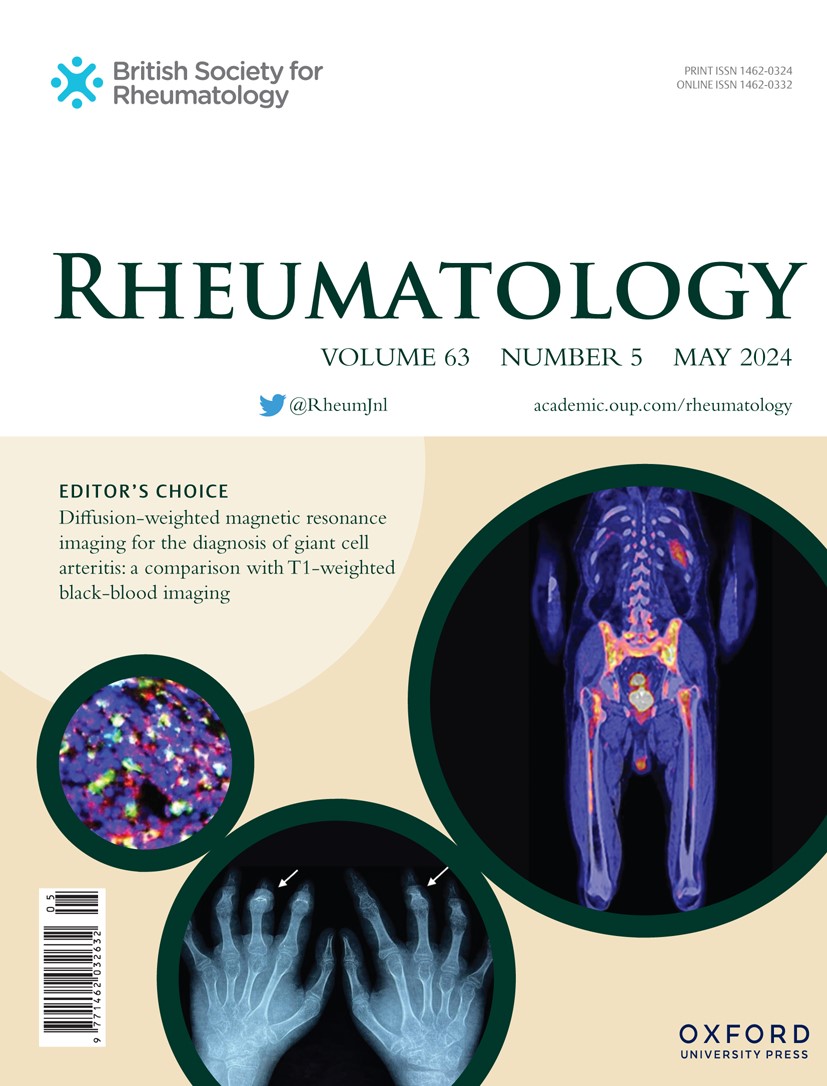Immunogenicity to Herpes Zoster recombinant subunit vaccine in immune-mediated rheumatic patients under treatment with JAK inhibitors
IF 4.7
2区 医学
Q1 RHEUMATOLOGY
引用次数: 0
Abstract
Objectives Patients with immune-mediated rheumatic diseases (IMRDs) face an elevated risk of varicella-zoster virus infection (VZV), and herpes zoster (HZ). Treatment with immunosuppressors further increases the risk. A new recently approved adjuvant recombinant inactive vaccine, offers safe protection against HZ. However, limited data exist on the efficacy of this new vaccine in patients with IMRDs treated with JAK inhibitors. We aimed to characterize B cell and T cell immune responses elicited by the HZ recombinant subunit vaccine in patients with IMRDs under treatment with JAK inhibitors, and to identify factors that might be associated with reduced immunogenicity, and therefore reduced protection. Methods We investigated humoral, and cellular CD4 and CD8 immune responses following a two-dose regimen of the recombinant inactive vaccine in 43 patients with rheumatic diseases treated with different JAK inhibitors. The responses were compared with age, gender and disease-matched healthy controls. Results Patients with IMRDs treated with JAK inhibitors showed reduced seroconversion rate (63% vs 100% and lower VZV IgG titers (1222 ± 411 vs 3048 ± 556, p< 0.0001) as compared with healthy controls. Functional T CD4 (IL-2 plus IFN-γ secretion) and T CD8 (Granzyme A and/or Granzyme B secretion) immune responses were also significantly diminished in IMRDs patients. Negative correlation was found between VZV antibody titers and age, specific treatments (baricitinib, tofacitinib, upadacitinib), cumulative methotrexate and glucocorticoid doses, history of multiple DMARDs, and treatment duration with JAK inhibitors. Functional T-CD4 responses but not functional T-CD8 responses also showed similar negative correlations. Positive associations were observed between functional T-CD4 and T-CD8 responses. Conclusions Our study provides valuable insights into the immune responses elicited by the recombinant inactive vaccine in patients with IMRDs treated with JAK inhibitors. In these patients we have observed a broad impact on the adaptive humoral and cellular immune responses, suggesting a potential reduction in protection against herpes zoster infection and VHZ reactivation.接受 JAK 抑制剂治疗的免疫介导型风湿病患者接种带状疱疹重组亚单位疫苗的免疫原性
目的 免疫介导风湿性疾病(IMRDs)患者感染水痘-带状疱疹病毒(VZV)和带状疱疹(HZ)的风险较高。使用免疫抑制剂治疗会进一步增加这种风险。最近批准的一种新型佐剂重组非活性疫苗可以安全预防 HZ。然而,关于这种新疫苗在接受 JAK 抑制剂治疗的 IMRD 患者中的疗效的数据还很有限。我们的目的是描述正在接受 JAK 抑制剂治疗的 IMRD 患者对 HZ 重组亚单位疫苗引起的 B 细胞和 T 细胞免疫反应的特征,并找出可能与免疫原性降低从而导致保护能力下降有关的因素。方法 我们调查了 43 名接受不同 JAK 抑制剂治疗的风湿病患者接种两剂重组非活性疫苗后的体液、细胞 CD4 和 CD8 免疫反应。这些反应与年龄、性别和疾病匹配的健康对照组进行了比较。结果 与健康对照组相比,接受 JAK 抑制剂治疗的 IMRD 患者血清转换率降低(63% vs 100%),VZV IgG 滴度降低(1222 ± 411 vs 3048 ± 556,p< 0.0001)。IMRDs患者的功能性T CD4(IL-2加IFN-γ分泌)和T CD8(颗粒酶A和/或颗粒酶B分泌)免疫反应也明显减弱。研究发现,VZV抗体滴度与年龄、特定治疗(巴利替尼、托法替尼、达帕替尼)、甲氨蝶呤和糖皮质激素累积剂量、多种DMARDs治疗史以及JAK抑制剂的治疗时间呈负相关。功能性T-CD4反应与功能性T-CD8反应之间也存在类似的负相关。功能性 T-CD4 反应和 T-CD8 反应之间呈正相关。结论 我们的研究为了解重组非活性疫苗在接受 JAK 抑制剂治疗的 IMRD 患者中引发的免疫反应提供了有价值的见解。在这些患者中,我们观察到适应性体液免疫和细胞免疫反应受到了广泛的影响,这表明对带状疱疹感染和 VHZ 再活化的保护能力可能会降低。
本文章由计算机程序翻译,如有差异,请以英文原文为准。
求助全文
约1分钟内获得全文
求助全文
来源期刊

Rheumatology
医学-风湿病学
CiteScore
9.40
自引率
7.30%
发文量
1091
审稿时长
2 months
期刊介绍:
Rheumatology strives to support research and discovery by publishing the highest quality original scientific papers with a focus on basic, clinical and translational research. The journal’s subject areas cover a wide range of paediatric and adult rheumatological conditions from an international perspective. It is an official journal of the British Society for Rheumatology, published by Oxford University Press.
Rheumatology publishes original articles, reviews, editorials, guidelines, concise reports, meta-analyses, original case reports, clinical vignettes, letters and matters arising from published material. The journal takes pride in serving the global rheumatology community, with a focus on high societal impact in the form of podcasts, videos and extended social media presence, and utilizing metrics such as Altmetric. Keep up to date by following the journal on Twitter @RheumJnl.
 求助内容:
求助内容: 应助结果提醒方式:
应助结果提醒方式:


